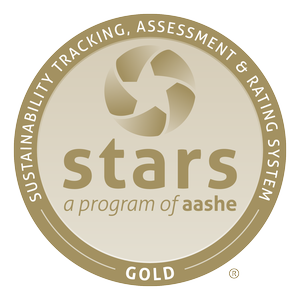NC State Recognized With Gold Rating for Sustainability


NC State’s sustainability efforts have earned the university its first Gold rating from the Association for the Advancement of Sustainability in Higher Education (AASHE).
AASHE’s Sustainability Tracking, Assessment and Rating System (STARS) is the most widely recognized international framework that more than 750 colleges and universities use to self report and measure their sustainability performance. With a Gold rating, NC State ranks in the top third of the more than 250 institutions with a current rating.
“We are proud of the sustainability progress that NC State has made,” said Jack Colby, the university’s Chief Sustainability Officer and Assistant Vice Chancellor for Facilities Operations. “This recognition acknowledges the collective efforts of NC State students, faculty and staff to create a more sustainable university.”
The STARS system awards points for sustainability accomplishments in four categories: academics, planning and administration, engagement and operations. A rating, which is assigned based on the number of accumulated points, is valid for three years. Though the university has reported sustainability data through STARS since 2011, this is the first time the university pursued a rating.
Among NC State’s recent sustainability advances are efficiency improvements — such as a 28 percent reduction in campus energy use and 50 percent reduction in campus water use since 2002 — and the development of many sustainability-related programs and initiatives.

The Business Sustainability Collaborative resources businesses and future business leaders, a Semester @ CMAST educates students on coastal environment issues, and the student EcoVillage provides sustainability-related living and learning opportunities.
In addition to a number of sustainability-related degrees offered by NC State, several sustainability-related faculty clusters have emerged along with numerous sustainability-related research projects and centers. Increasingly, faculty are integrating sustainability challenges in courses as real-world examples that boost students’ career readiness.
About half of university waste is diverted from landfills through recycling and composting of pizza boxes and at dining halls and football games. Most new campus buildings pursue national sustainability certification, and University Housekeeping cleans campus with green certified products. The campus bus system averages more than 3 million passenger trips annually and a student-established Sustainability Fund provides grants to improve campus sustainability.
The university also has a sustainability student leadership program, a sustainable workplaces and events certification program, and the annual Green Brick Awards to recognize outstanding sustainability contributions.
NC State also earned STARS innovation points for hosting an Americorps member who focuses on the connection between sustainability and diversity, the development of a university task force on wellness, University Dining’s increasing use of campus-grown food, and many high-impact learning experiences that incorporate sustainability.
“The NC State community has a lot to be proud of,” said Tracy Dixon, director of the University Sustainability Office. “This sustainability progress and momentum is a result of growing campus-wide collaboration around sustainability.”
STARS Gold is the latest of many sustainability honors for NC State, including recognition from the Princeton Review and the 2014 APPA Sustainability Award in recognition of sustainability excellence in campus educational facilities.
NC State’s complete STARS report is available online.
- Categories: